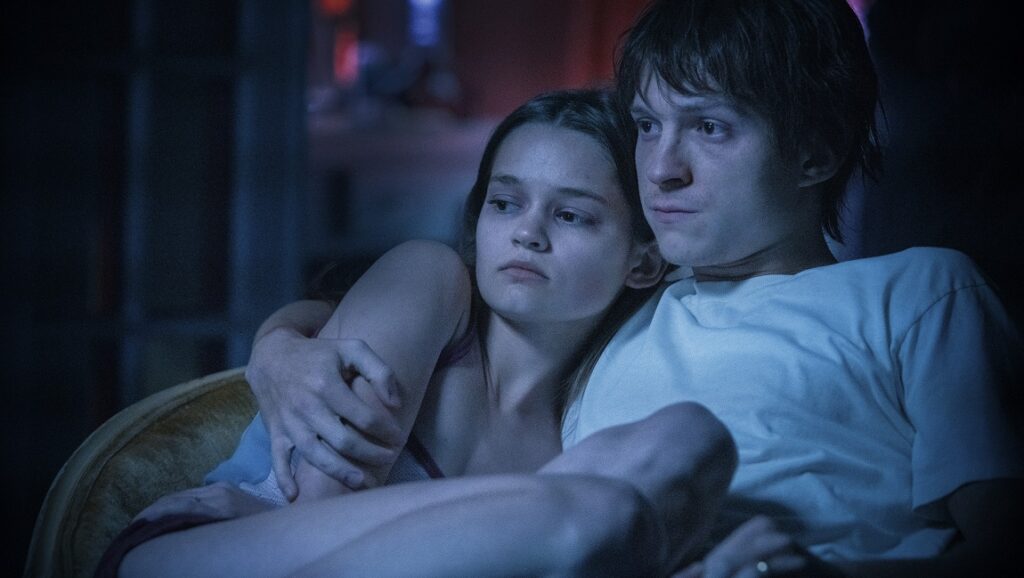Cherry is a cartoonish failure of imagination, technique, and performance.
Joe and Anthony Russo, the producer/directors who found themselves at the helm of the biggest studio franchise in Hollywood history, probably thought it would satisfy their creative impulses and prove their filmmaking bona fides to make something small after Avengers: Endgame, as if anything wouldn’t be small after that. A “one for us” after two or three for them. The brothers and industry vets settled on Cherry, Nico Walker’s semi-autobiographical novel about a regular degular kid from Cleveland who goes into the Army, gets a healthy dose of PTSD, gets addicted to Oxy, and starts robbing banks. How much more timely could you get? Unfortunately, it turns out the Russos are far more successful producers than they are actual directors; Cherry is a painfully generic pastiche/synthesis of Scorsese, Chuck Palahniuk, stylistic tics, and inept performances that constantly pantomimes its pretensions to edginess while spitting up nearly Afterschool Special-levels of cliché. It’s a film that would barely have been refreshing in 2004.
Spider-Man Tom Holland is the eponymous Cherry, a go-nowhere student who’s introduced falling in love at first sight with Emily (Ciara Bravo), a girl in his class about whom we learn materially nothing except that she is tiny and mutually loves Cherry for some reason, possibly because he’s the protagonist and she’s a trophy and therefore the focus of his every decision. These two young lovers have a perfectly ordinary college-age adult relationship wherein she has ambition and he’s happy to coast, which of course causes a temporary breakup that A) she of course immediately regrets for no articulated reason and B) spurs Cherry to join the fucking Army, because he supposes it’s better than Cleveland.
Military life does the boy no favors, although, like everything else in this movie, it’s presented as a mishmash of aspect ratios, on-screen text, freeze frames, split-screens, and voice-over narration; anything to lend this thoroughly generic material the illusion that it is air quotes-cinematic. What Cherry’s time in Iraq does give him is a case of PTSD, and he comes home to an equally stylistically busy yet entirely unfocused addiction to drugs that eventually — once again, for no discernible reason other than the dictates of this endlessly clichéd “true story” — entwines Emily. From there, it’s a quick hop to armed robbery. It’s interesting, as a side note, that you never see modern depictions of the military without attendant PTSD anymore. Does nobody in the movies come home from combat without a decimated psyche because that’s a reflection of reality, because it’s good drama, or because it’s fashionable? In any case, Cherry isn’t interested in any of that.
The film’s trifurcated structure is, like the rest of its formal messing about, just one more cheap attempt to lend this tale some vitality, but really the Russos are adrift. Is there a film to be made about aimless young American men and women seduced and abandoned by myth who wind up deposited in a stagnant economy that only exists to prop up the war that psychically terminated their spiritual and emotional lives? Of course there is. There’s a long line of filmmakers who’ve tried and failed to make exactly this movie (cf. Sam Mendes’ Jarhead for just one stupid example). But none of them can get past their dumb urges to pander to an audience’s expectations that the military be depicted as a cartoon only an idiot would be tantalized by, that drug addiction could only be a con foisted upon us by Big Pharma, and that the only way out of this spiral of crime and self-abuse is a stint in America’s secondary state — the carceral one. This is just a mere jumble of concepts one has read about in multiple Atlantic articles, dramatized for people who might run across it on a streaming service’s algorithm. It’s Goodfellas without the seduction and only the scold.
Baby-faced Holland, for his part, is perhaps the pluckiest kid on Earth, and absolutely cannot, for all his shouting and shaking, manage to convince anyone that he is forever haunted by the horrors of combat, heroin, or a bad breakup. Ms. Bravo has nothing to do except be pretty and follow the script into degradation and ultimate redemption; she has no interiority whatsoever. Nobody else has much to contribute except perhaps Jack Reynor, who provides a little bit of bro-posturing energy as a drug-dealer character ridiculously named “Pills and Coke,” as if this was a ripoff of a circa-1999 David Fincher movie. Cherry‘s a complete failure: of imagination, of technique, of performance, and, after coming in at a whopping 140 minutes, Spider-Man doesn’t even fight Thanos at the end.
You can catch Joe and Anthony Russo’s Cherry in theaters February 26 and streaming on Apple TV+ on March 12.


Comments are closed.